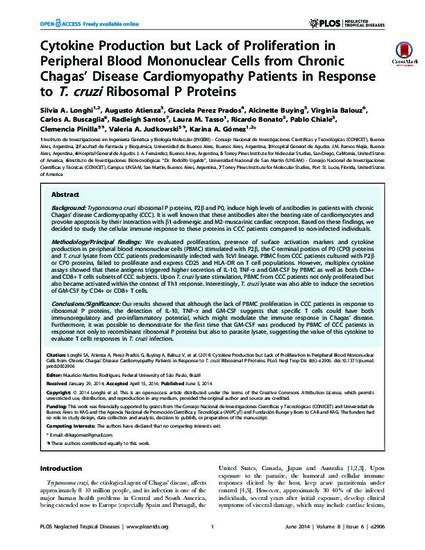
- Cytokines,
- Trypanosoma cruzi,
- T cells,
- Chagas disease,
- Parasitic diseases,
- Cardiomyopathies,
- Cytotoxic T cells,
- Immune response
Background
Trypanosoma cruzi ribosomal P proteins, P2β and P0, induce high levels of antibodies in patients with chronic Chagas' disease Cardiomyopathy (CCC). It is well known that these antibodies alter the beating rate of cardiomyocytes and provoke apoptosis by their interaction with β1-adrenergic and M2-muscarinic cardiac receptors. Based on these findings, we decided to study the cellular immune response to these proteins in CCC patients compared to non-infected individuals. Methodology/Principal findings
We evaluated proliferation, presence of surface activation markers and cytokine production in peripheral blood mononuclear cells (PBMC) stimulated with P2β, the C-terminal portion of P0 (CP0) proteins and T. cruzi lysate from CCC patients predominantly infected with TcVI lineage. PBMC from CCC patients cultured with P2β or CP0 proteins, failed to proliferate and express CD25 and HLA-DR on T cell populations. However, multiplex cytokine assays showed that these antigens triggered higher secretion of IL-10, TNF-α and GM-CSF by PBMC as well as both CD4+ and CD8+ T cells subsets of CCC subjects. Upon T. cruzi lysate stimulation, PBMC from CCC patients not only proliferated but also became activated within the context of Th1 response. Interestingly, T. cruzi lysate was also able to induce the secretion of GM-CSF by CD4+ or CD8+ T cells. Conclusions/Significance
Our results showed that although the lack of PBMC proliferation in CCC patients in response to ribosomal P proteins, the detection of IL-10, TNF-α and GM-CSF suggests that specific T cells could have both immunoregulatory and pro-inflammatory potential, which might modulate the immune response in Chagas' disease. Furthermore, it was possible to demonstrate for the first time that GM-CSF was produced by PBMC of CCC patients in response not only to recombinant ribosomal P proteins but also to parasite lysate, suggesting the value of this cytokine to evaluate T cells responses in T. cruzi infection. Author Summary
Chronic Chagas' disease Cardiomyopathy (CCC) is the most frequent and severe consequence of the chronic infection by protozoan parasite T. cruzi. Patients with CCC develop high levels of antibodies against ribosomal P proteins of T. cruzi, called P2β and P0. These antibodies can cross-react with, and stimulate, the β1-adrenergic and M2 muscarinic cardiac receptors, inducing a functional and pathological response in cardiomyocytes. In this study, we focused on the cellular immune response developed by CCC patients in response to T. cruzi ribosomal P proteins. Peripheral blood mononuclear cells (PBMC) from CCC patients stimulated with both proteins neither proliferated nor induced the expression of activation markers on CD4+ and CD8+ T cells. However, these cells responded by the secretion of IL-10, TNF-α and GM-CSF, giving evidence that there is indeed a pool of specific T cells in the periphery responsive to these proteins. Interestingly, the cytokines profile was not related with those described to whole parasite lysate or other recombinant proteins, suggesting that each parasite protein may contribute differently to the complex immune response developed in patients with Chagas' disease.
Available at: http://works.bepress.com/radleigh-santos/14/

Copyright: © 2014 Longhi et al. This is an open-access article distributed under the terms of the Creative Commons Attribution License, which permits unrestricted use, distribution, and reproduction in any medium, provided the original author and source are credited.